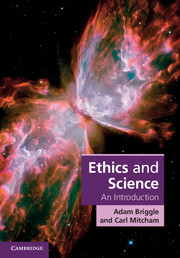Book contents
- Frontmatter
- Contents
- List of figures and tables
- Preface
- 1 Introduction and overview
- 2 Ethical concepts and theories
- 3 Science and its norms
- 4 Research ethics I
- 5 Research ethics II
- 6 Research ethics III
- 7 The science of ethics
- 8 Transition
- 9 Science and politics I
- 10 Science and politics II
- 11 Science and ideational culture
- 12 Science applied
- Epilogue Looking back, leaning forward
- Appendix Ethics codes
- Bibliography
- Index
- References
5 - Research ethics II
Science involving humans
Published online by Cambridge University Press: 05 November 2012
- Frontmatter
- Contents
- List of figures and tables
- Preface
- 1 Introduction and overview
- 2 Ethical concepts and theories
- 3 Science and its norms
- 4 Research ethics I
- 5 Research ethics II
- 6 Research ethics III
- 7 The science of ethics
- 8 Transition
- 9 Science and politics I
- 10 Science and politics II
- 11 Science and ideational culture
- 12 Science applied
- Epilogue Looking back, leaning forward
- Appendix Ethics codes
- Bibliography
- Index
- References
Summary
Following a review of some historical cases of fraud and misconduct in science, Chapter 4 considered key elements of GSP (good scientific practice) or RCR (responsible conduct of research). Yet well before public and professional attention was directed toward GSP or RCR in general the ethical practice of research had become an even more public and controversial issue in relation to two special types of scientific work, those having to do with the use of humans and animals in research. Interestingly, the issue of the ethical treatment of animals actually preceded that of the proper treatment of human beings, at least as a popular issue. Because of its greater salience today, however, it is appropriate to deal first with scientific research involving humans before turning, in the following chapter, to a discussion of research involving nonhuman animals.
Setting the stage: clinical trials in developing countries
One of the most human-intensive areas of science is that of experimental studies or trials of medical therapies. There are many more types of research with humans, including biological and genetic, psychological and social scientific, and even pedagogical research. But clinical trials research raises most issues in the most intensified form, and it is in the biomedical area that ethical standards have been developed and then extended to other types of research on human beings. The single most salient issue not raised in the biomedical area itself concerns the appropriateness of extending or adapting the standards of biomedical research to biological, genetic, psychological, and social scientific research involving human subjects.
- Type
- Chapter
- Information
- Ethics and ScienceAn Introduction, pp. 125 - 155Publisher: Cambridge University PressPrint publication year: 2012

